
BUSINESS:
Finnish textile firm Lindström opens first service center in Vietnam
INTERNATIONAL:
Philippines exploring labor agreement with Sweden
COMMUNITY:
Fastelavn in Bangkok, Hong Kong, Manila, Singapore



BUSINESS:
Finnish textile firm Lindström opens first service center in Vietnam
INTERNATIONAL:
Philippines exploring labor agreement with Sweden
COMMUNITY:
Fastelavn in Bangkok, Hong Kong, Manila, Singapore


Age 3 to 15 year old: 16,000 - 20,000THB per week
Boarding option from age 8: 37,000 - 38,000THB per week
Early bird discount! Summer camp with Boarding -2,000THB per week*
23 June - 18 July A
















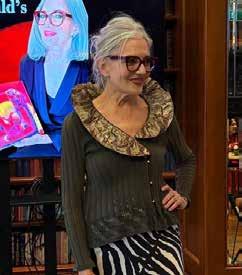

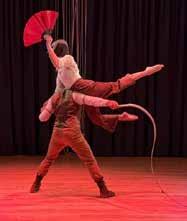
9 Thai Nordic Members Find Strength in Community After Earthquake
39 NBAS honors Jacqueline Poh for strengthening Norway-Singapore ties
41 Former Swedish Consul in Pattaya passed away
49 Danish embassy in Beijing welcomes spring with fruit tree planting
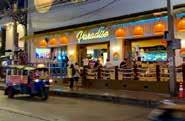

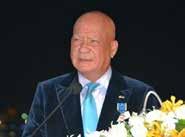



This summer, Norway will be hosting the Internet Governance Forum (IGF) 2025 from June 23 to 27 in Lillestrøm near Oslo, Norway. The meeting is a United Nations initiative that has convened annually since 2006 - this year will be the 20th anniversary of the forum.
Hosting the IGF is a notable achievement for Norway. It will be the largest UN meeting ever held in Norway. The forum is expected to attract thousands of participants from governments, civil society, academia, and the private sector to address critical issues in global Internet governance.
Cybersecurity threats are becoming more sophisticated and more frequent. At the same time, the internet remains a space where human rights are often tested - whether it be the freedom of expression, privacy, systematic misinformation, sexual exploitation of children, scams and economic crimes. Meanwhile, millions around the world still lack basic digital access. The IGF is one of the few global platforms where all of these concerns can be addressed in the same room.
The previous IGF highlighted the transformative potential of digital technologies in advancing peace, sustainability, and socioeconomic development, emphasizing inclusive access to ensure no one is left behind in the digital economy.
The IGF 2025 in Norway represents a unique opportunity for stakeholders worldwide to collaborate on building a more inclusive, secure, and sustainable digital future. The sweeping advances of AI - Artificial Intelligence will likely take center stage. In a world increasingly shaped by digital connectivity, the need for trustworthy, fair, secure, and inclusive internet governance has never been greater.
It is good to know that this important meeting is hosted by Norway. With its high ethical standards and solid social values, Norway is ideally positioned to help shape a positive outcome of this important forum.
We trust in you, Norway!

Gregers Moller Editor in Chief
ScandAsia is a printed magazine and online media covering the people and businesses of Denmark, Sweden, Norway, Finland living and working in China, Hong Kong, Thailand, Malaysia, Singapore, Indonesia, Philippines, Vietnam, Cambodia, Laos and Myanmar.
Who should subscribe:
ScandAsia subscribers are typically Nordic expats and companies from the Nordic countries living in and active in Asia. Another group of subscribers are Nordic people living in the Nordic countries who subscribe to ScandAsia for personal or business reasons. We also have many Asian subscribers, who for a wide range of reasons are following the activities of the Nordic expats and companies via a subscription to ScandAsia.
The ScandAsia magazine is produced every month and distributed to all print version subscribers via postal services and to all eMagazine subscribers via email. Subscribing to the eMagazine is FREE - simply sign up on the ScandAsia.com website.
Become a ScandAsia user/ get free digital ScandAsia magazine or paid subscription via www.scandasia.com!
Publisher : Scandinavian Publishing Co., Ltd. 211 Prasert Manukitch 29 Prasert Manukitch Road
Bangkok 10230, Thailand
Tel. +66 2 943 7166-8
Fax: +66 2 943 7169
E-mail: news@scandasia.com
Editor-in-Chief : Gregers A.W. Møller gregers@scandasia.com
Advertising : Finn Balslev finn@scandmedia.com
MB: +66 81 866 2577
Graphic Designer : Peerapol Meesuwan Peerapol@scandmedia.com
Production Manager: Sopida Yatprom







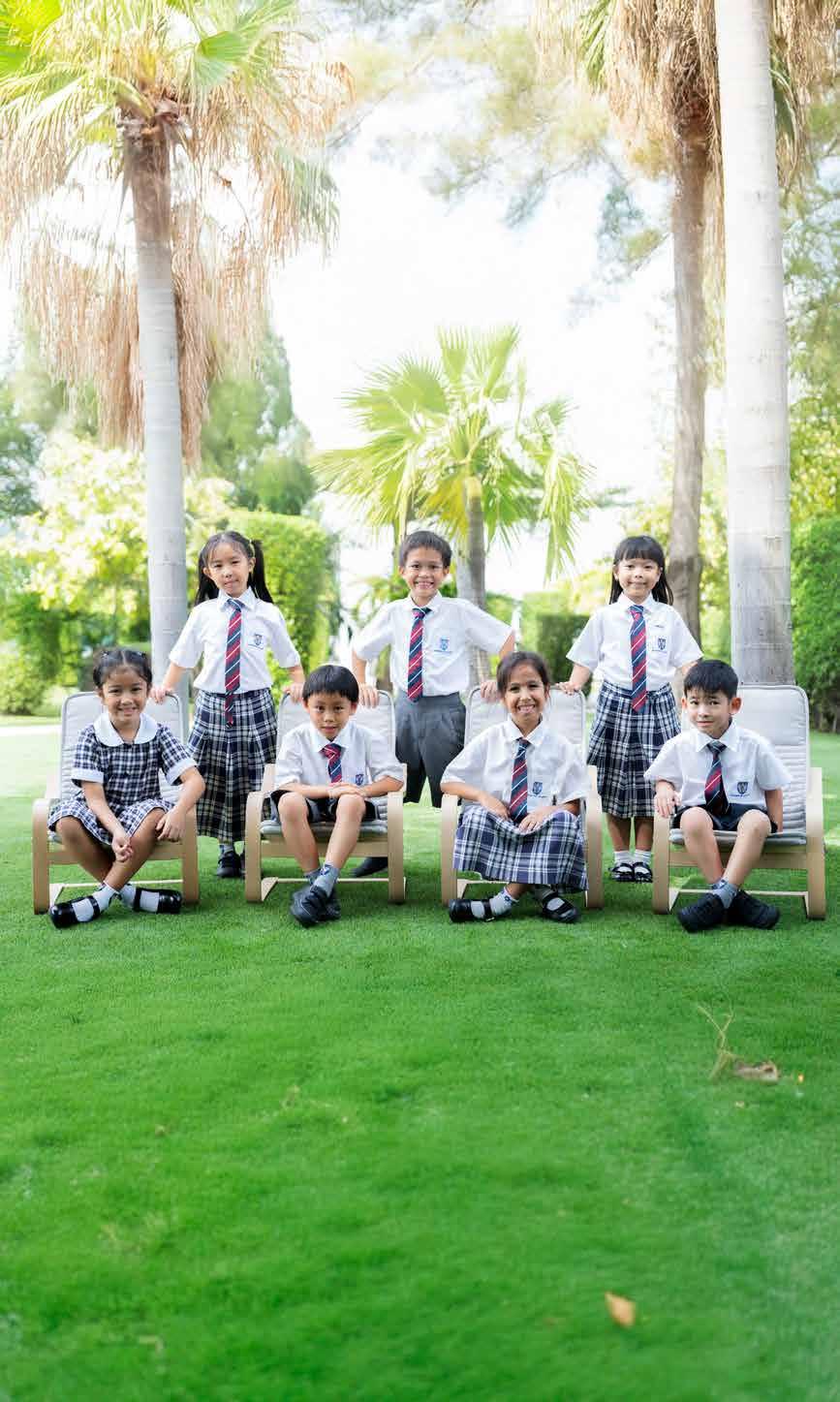

Pandora’s crafting facilities in Thailand experienced only minimal impact from today’s earthquake in Myanmar. All employees are reported safe, and initial assessments indicate only minor damage to buildings, Pandora informs.
“Pandora’s top priority is the safety and well-being of its employees. As a precaution, Pandora temporarily paused production on Friday afternoon, but operations are expected to resume on Monday, March 31, following a technical evaluation of the facilities. The company currently expects no impact to

product availability.,” writes Pa dora in a press statement.
Pandora employs 11,300 people across three crafting facilities in Bangkok and Lamphun, Thailand.
Pandora is the world’s largest
jeweller brand, specialising in the design, crafting and marketing of accessible luxury jewellery made from high-quality materials. Each piece is created to inspire self-expression, allowing people to share their stories and passions through meaningful jewellery. Pandora jewellery is sold in more than 100 countries through 6,800 points of sale, including more than 2,700 concept stores.
Headquartered in Copenhagen, Denmark, Pandora employs 37,000 people worldwide and crafts its jewellery using only recycled silver and gold.

Following the 7.7-magnitude earthquake in central Myanmar on March 28, 2025, the Danish, Finnish, and Swedish embassies in Bangkok issued advisories urging their citizens in Thailand to stay alert
and follow local guidance.
Although the epicenter was near Mandalay, tremors were strongly felt in Thailand, including Bangkok. A tall public building under construction collapsed, trapping dozens
of workers, and authorities temporarily suspended Bangkok’s BTS Skytrain, MRT subway, and air traffic for safety inspections. The government declared Bangkok a disaster area and mobilized the armed forces.
The embassies advise Nordic travelers and residents in Thailand to:
• Stay updated through local media and authorities.
• Follow Thai safety instructions.
• Inform their families of their wellbeing.
• Register through official platforms like Danskerlisten (Denmark) and Svensklistan (Sweden).
Consular services are available 24/7: Denmark: +45 3392 1112 / borger@um.dk
Finland: +358 9 160 55555 / paivystys.um@gov.fi
Sweden: +46 (0) 8 405 50 05
More than twenty members of the Thai-Nordic Association gathered at Paradise Beach Bar on the evening of the earthquake that struck southern Thailand, turning an uncertain night into a quiet show of resilience.
The social event, The Social: Summer Time, had been planned in advance, but after the tremors, organizers decided to proceed, posting on Facebook:
“We’re all shocked by the earthquake, but community and keeping your mind on something else is good. If you can’t get back into your building, you can join us at Paradise Beach Bar.”
The message resonated, draw-

ing in members unable to return home due to building inspections. The atmosphere remained calm and supportive, offering a much-needed distraction and space for discussion.
The Thai-Nordic Association regularly hosts informal gatherings, but this one became a reminder of the strength found in community, even in unexpected times.





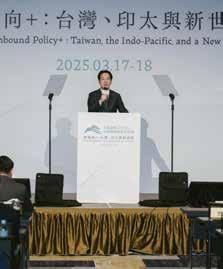
Anders Fogh Rasmussen, former prime minister of Denmark, is set to speak at the 2025 Yushan Forum in Taiwan, according to Taipei Times. Rasmussen will be joined by former Slovenian prime minister Janez Janša, as the forum aims to strengthen cooperation between Taiwan and its regional and international partners.
The two-day Yushan Forum began on 17 March 2025 in Taipei under the theme of “New Southbound Policy+: Taiwan, the IndoPacific and a New World.”
The participation of Rasmussen and Janša underscores growing ties between Taiwan and Europe. Rasmussen, who also served as NATO Secretary-General, has been a vocal advocate for democracy and security in the Indo-Pacific.
The Yushan Forum, first held in 2017, serves as a platform for dialogue on regional development and international collaboration. Previous editions have hosted government leaders, business executives, and academics from across Asia and beyond.
Cambodian Prime Minister
Hun Manet and Finnish Ambassador Kristiina KuvajaXanthopoulos have reaffirmed their commitment to enhancing bilateral cooperation in digital transformation, environmental protection, trade, investment, and business development during a meeting at the Peace Palace in Phnom Penh on Wednesday 12 March 2025.
Mrs. Kuvaja-Xanthopoulos, Finland’s non-resident ambassador to Cambodia, is based in Bangkok and led a Finnish delegation to the Kingdom. She praised Cambodia’s progress in various sectors and emphasized Finland’s dedication to strengthening ties, particularly in supporting small and medium-sized enterprises (SMEs) and fostering innovation.
Both parties highlighted the
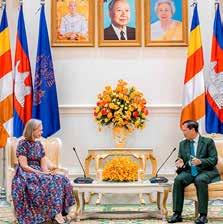
strong relationship between Cambodia and Finland over the past 55 years, notably in mine clearance, agriculture, and land registration.The discussions also touched on the development of digital infrastructure and policies that would support economic growth and sustainable development in Cambodia.
Kuvaja-Xanthopoulos pledged
to work towards elevating bilateral cooperation, while Hun Manet expressed appreciation for Finland’s contributions to Cambodia’s socio-economic development. The Prime Minister outlined key policies aimed at improving the well-being of Cambodian citizens, with a focus on healthcare, education, vocational training, job creation, and digital connectivity.
Hun Manet encouraged the ambassador to continue engaging with Cambodian ministries and institutions to further strengthen cooperation between the two nations.
Ambassador Kuvaja-Xanthopoulos’s visit reflects Finland’s growing interest in deepening collaboration with Cambodia, with both countries looking forward to expanding their partnership in the years ahead.
The Philippines is seeking to establish a labor agreement with Sweden to enhance the protection of overseas Filipino workers (OFWs) in the country, according to the Department of Migrant Workers (DMW).
Migrant Workers Secretary
Hans Leo J. Cacdac met with Foreign Affairs Assistant Secretary and Ambassador-Designate to Sweden Patrick A. Chuasoto to discuss initiatives aimed at safeguarding the rights and welfare of Filipino workers in Sweden, the agency said in a statement on Wednesday.
“Both officials expressed optimism about the future support and protection of OFWs in Sweden with the possibility of forging a bilateral agreement that promotes regular,
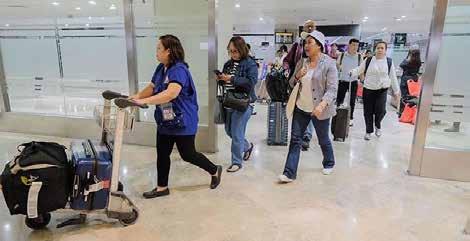
ethical, orderly, and sustainable migration of OFWs,” the statement said.
The Philippines is also considering establishing a Migrant Workers Office in Sweden, the agency added. Currently, there is no bilateral labor agreement between the two countries. However, Chuasoto commended the DMW’s efforts to enhance the skills of Filipino workers through partnerships with the Technical Education and Skills Development Authority.



How to find the best school for your child in Southeast Asia when values, culture, curriculum and long-term plans must all align. This guide helps expat families navigate their options with clarity and confidence.
By Gregers Moller
When moving abroad as a family, few decisions carry as much emotional weight as choosing the right school for your child. Whether you’re relocating to Bangkok, Singapore, Jakarta, Kuala Lumpur, Ho Chi Minh City, or Manila, the process can feel overwhelming—and deeply personal.
For expat parents, the challenge is not just about ticking off academic checklists. It’s about finding an environment that nurtures curiosity, supports well-being, and reflects at least some of the educational values you hold dear.
This guide is your entry point into the complex - but ultimately rewarding -task of choosing an international school in Southeast Asia. On the pages following these general suggestions you will hear directly from a number of international schools that explain what makes their approach unique.
Know your family’s educational priorities
The first step is not to compare websites or tour campuses - it’s to sit down and clarify your own goals.
Are you hoping for a school that mirrors the curriculum back home? Do you intend to stay for just a few years, or might your child need a consistent educational path across multiple countries? Are values like creativity, freedom, and well-being central to your decision?
• What languages does our child need support in?
• Are we prioritising a specific curriculum, such as IB, British, or American?
• Is cultural retention or mother-tongue instruction important?
• What kind of social or emotional support will help our child adjust best?
Answering these will help filter the options before you even look at fees or facilities.
Most international schools in the region offer one of the following:
• International Baccalaureate (IB): Known for its inquirybased, globally minded approach. It aligns well with Scandinavian values and is widely recognised.
• British Curriculum: Structured and familiar to many Europeans. Often uses IGCSE and A-Levels.
• American Curriculum: Flexible and broad, with AP options for older students.
• Other national curricula: French, German, Japanese, Korean, and occasionally even Nordic-based curricula exist in select cities.

The best school is the one where your child will feel safe, grow with confidence, and develop the skills they need for the future.

The IB is especially popular among Scandinavian families for its balance of academics and soft skills. But the best choice depends on where your child might continue their education later.
Weigh local vs international
Local schools are not off the table, especially for families with one parent from the host country or for younger children with no prior schooling. Local schools are significantly more affordable and provide strong language immersion.
However, they often differ from Nordic educational norms in terms of classroom dynamics, hierarchy, and even discipline. In some countries, physical punishment has not been abolished—a discussion worth having with any school under consideration.
For most expat families, international schools provide a more familiar framework. They blend various pedagogical styles, offer English-language instruction, and present a multicultural environment where children can feel like they belong.
Factor in cost, but don’t equate it with quality
Annual tuition at international schools can range from as low as USD 2,000 to over USD 35,000. Some companies cover these costs, but many expat families pay out of pocket.
Remember:
• More expensive doesn’t always mean better fit.
• Smaller schools may have fewer facilities but offer stronger community ties.
• Ask about extra fees: books, uniforms, transport, afterschool activities.
Some schools allow monthly payments, others require termly or annual fees in advance. Always clarify this early.
Think logistically: location and daily routine
In many Southeast Asian cities, traffic congestion can heavily impact school choices. A 10 km commute might take over an hour during rush hour.
Questions to ask:
• How long will the commute be?
• Is school transport reliable and safe?
• Are there Nordic families nearby?
Living close to the school not only saves time but also facilitates friendships, participation in school events, and after-school engagement.
Culture and community: do they fit your child?
Some schools are lean academic, others holistic. Some are structured and formal; others informal and nurturing.
Visit if you can. Virtual tours and open house sessions can also reveal a lot. Talk to other parents, particularly Nordic ones, to get a feel for how well the school aligns with your values.
Look for:
• Social and emotional support systems
• Staff stability and training
• Inclusive policies and openness to diversity
Language support and cultural connection
While English is the main language in most international schools, not all offer the same level of support for newcomers.
Some provide:
• English as an Additional Language (EAL)
• Pre-language immersion programmes
• Mother tongue support (Swedish, Danish, Norwegian, Finnish)

Many Scandinavian families also maintain their languages through weekend programmes or after-school lessons via local expat communities or embassies.
International schools often compete on facilities and extracurriculars. From swimming pools and science labs to music academies and robotics clubs, options abound.
But ask:
• Are there activities your child genuinely enjoys?
• Does the school encourage balanced development, not just academics?
Participation in non-academic areas often helps children adjust more quickly and feel at home.
Look for schools with international accreditation, such as:
• CIS (Council of International Schools)
• IBO (International Baccalaureate Organization)
• WASC or NEASC (American accreditations)
• BSO (British Schools Overseas)
Reputation matters too. Talk to other expat families, especially those who have transitioned in or out of the school recently.
relationship and communication
Good schools maintain open communication. Find out:
• How are concerns handled?
• Are regular updates provided?
• Is there a parent association or volunteer programme? You want a school that sees parents as partners, not just fee-payers.
Even after you’ve made your choice, stay engaged.
• Ask about their day.
• Watch for changes in mood, appetite, or language use.
• Encourage social connections outside school.
If your child develops in any way you find disturbing or even develops signs of discomfort with going to school, you should think twice before you tell your child that “this is life – it is not always pleasant!”. Allow them to adjust, support them in their transition and understand that this may be hard for them.
Some children go through a honeymoon period before hitting culture shock. Be supportive, patient, and proactive.
There is no single best school for all children. The best international school in Asia is the one where your child will feel safe, grow with confidence, and develop the skills they need for the future.
Trust your instincts. Talk to others. Visit the schools. And once you’ve chosen, stay involved.
Should you eventually realize that you failed in making the best choice, make sure your child understands that this is not their failure, but yours. Ask them if they would like to move to another school and if so, ask them this time to help you select a better match.
This theme section continues with first-hand presentations from selected international schools in the region. Their insights may help you discover just the right fit for your family’s educational journey abroad.


AWhat shapes who we are? Is it the grades we achieve, or the things we learn? Or is it what we learn about ourselves both inside and outside the classroom?
By: Jessica Murphy, Art
Teacher/GCD
t NIST International School in Bangkok, education extends far beyond academic achievement. As a school committed to nurturing globally minded, compassionate, and action-oriented individuals, NIST is proud to be the only school in Thailand to offer the Global Citizen Diploma (GCD) a unique and transformative credential that celebrates students’ character and the experiences that nurture their global citizenship.
The GCD is an optional diploma that complements NIST’s existing academic programs, such as the IB Diploma Programme, the International Award, and the school’s extensive service learning program. It provides students with the opportunity to reflect on how they are living out the values of global citizenship through leadership, service, cultural understanding, and personal growth. Rather than focusing solely on academic results, the GCD recognizes the lived experiences and perspectives that shape who students are becoming.
Coordinator
The core of the GCD is global understanding, intercultural communication, and community engagement —because these elements are essential for thriving in an increasingly interconnected world. In a time when empathy and cultural fluency are more important than ever, the GCD encourages students to move beyond the classroom and connect with diverse communities and global issues.
Within their selection from the other 12 GCD competencies, students submit evidence of their participation in significant experiences, alongside personal reflections that highlight their growth and impact. Whether volunteering with local partners, leading initiatives, exploring identity through art, or collaborating across cultures, each entry represents a student’s commitment to making a meaningful difference.
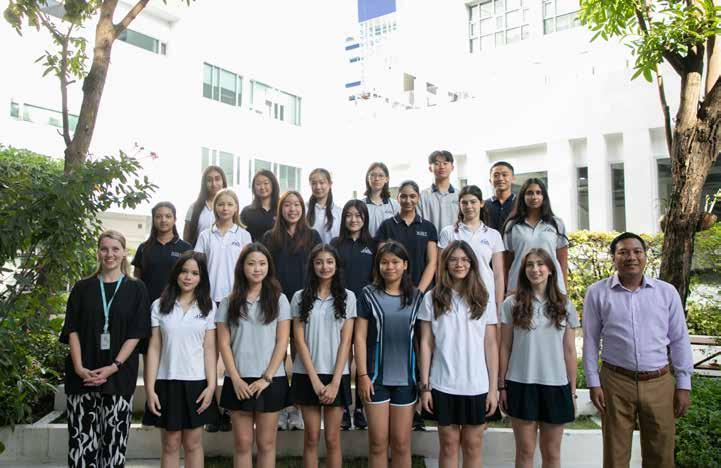
At NIST, many students find that their GCD journey aligns with the school’s broader mission to inspire individuals to achieve their potential and create a better world. The diploma gives structure and recognition to passions such as sustainability, mental health advocacy, and social justice—many of which grow into long-term projects that extend beyond school.
As part of a global consortium of 12 schools across 6 continents offering the GCD NIST students also take part in cross-campus collaborations like the GCD UP These shared experiences provide powerful opportunities for intercultural learning and global connection.
This year, a group of NIST students visited our partner school in Nanjing International School, China to participate in the GCD UP. By engaging with Chinese history and culture with peers from other GCD schools, our students gained new insights into their own identities and values.They visited historic sites, collaborated on projects, and connected through shared meals and stories.
More than just a trip, the experience offered a deeper understanding of different worldviews and sparked lifelong friendships that will shape how these students move through the world. With GCD schools located across continents, these in-person exchanges create a rare and valuable opportunity for students to see global citizenship in action.
One of the most impactful aspects of the GCD is that students take the lead in driving it forward. Students choose experiences that are meaningful to them.This fosters ownership, self-awareness, and authentic storytelling. Through this journey, students not only develop skills like empathy, critical thinking, and intercultural competence but also create a portfolio that reflects who they are as people, not just students. Our teachers support GCD students through workshops, and mentoring, in collaboration with our dedicated students group “Student Steering Committee” which helps guide others in their journey of growth and reflection.
The GCD is more than a credential as it’s a declaration of values, action, and hope. NIST graduates who earn the GCD leave with a strong sense of purpose and a deeper understanding of their role in a global society. They are ready not only for university but for the challenges and responsibilities of the world beyond.


In a world where traditional education often struggles to keep pace with the demands of the modern workforce, Bangkok Patana School has an offering that’s as forward-thinking as it is practical: the International Baccalaureate Career-related Programme (IBCP). Equal parts academic rigour and real-world experience, this dynamic pathway is designed for students aged 16 to 19 who are ready to blend knowledge with know-how.
The IBCP is a game-changer. It pairs the intellectual stimulation of IB subjects with career-focused learning, ensuring students graduate with both critical thinking prowess and industry-relevant skills. This is education with purpose, designed not just for university acceptance letters, but for life beyond the lecture halls.
The Core of the IBCP: A Formula for Success
What sets the IBCP at Bangkok Patana apart? It’s about
cultivating the kind of adaptable, ethical and globallyminded graduates that today’s employers crave. Here’s what students can expect:
• Personal and Professional Skills: Think of this as an executive training program for teenagers. Communication, leadership, problem-solving—it’s a crash course in the soft skills that make or break a career.
• Language and Cultural Studies: In a hyperconnected world, understanding different cultures and speaking a second language aren’t just advantages; they’re necessities. This component broadens students’ horizons and prepares them for international careers.
• Community Engagement: This isn’t theoretical philanthropy—students actively participate in service projects, developing social responsibility while gaining hands-on experience.
• Reflective Project: Part research, part ethics deep dive, this extended project challenges students to tackle real-world dilemmas within their chosen career field.
The IBCP program at Bangkok Patana offers three specialised pathways, each linked to internationally recognised BTEC qualifications:
• Art & Design Specialism: For the creatively inclined, this pathway (tied to the Pearson BTEC Level 3 Diploma in Art and Design) nurtures artistic talent while instilling professional discipline.
• Business Specialism: Aspiring CEOs and entrepreneurs will gain a robust foundation in business through mentoring, dynamic and hands-on learning experiences, setting the stage for future success in the world of business. Framed around the Pearson BTEC Level 3 Diploma.
The program at Bangkok Patana moves beyond enabling students to absorb information—it’s about applying it. To bridge the gap between classroom learning and realworld experience, students participate in three specially curated Enrichment Weeks , each designed to elevate their career preparation:
• Inspiration Week (November, Year 12): The first of our enrichment weeks is designed to inspire our students’ learning across their two-year specialism. Workshops, guest speakers, and im -

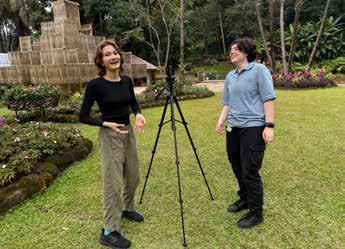
mersive activities ignite students’ passion for their chosen field, offering a glimpse into professional possibilities.
• Industry Week (May, Year 12): Forget theoretical case studies—this is a backstage pass to the working world. Students visit leading companies, network with professionals, and gain hands-on experience in their respective industries.
• Futures Week (November, Year 13): With graduation looming, this week focuses on mapping out the next steps—whether that’s university, internships, or launching straight into the workforce. Students explore higher education options, meet industry insiders, and fine-tune their future plans.
The IBCP is an exciting option for students who have a particular passion in one of the three specialism areas. It’s rigorous yet adaptable, academically challenging yet career-focused. Whether you’re an aspiring artist, a budding business mogul, or a sports industry hopeful, this program strikes the balance between intellectual challenge and practical experience.
Ready to take the leap? Contact admissions@ patana.ac.th to explore how their IBCP program can fuel your child’s passion into future skills.
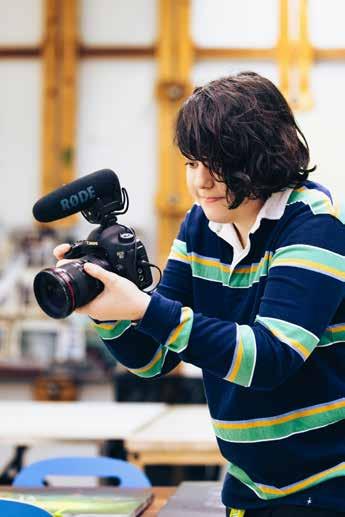

Navigating the college admissions process can be overwhelming for students and families, but International School Bangkok (ISB) sets itself apart with a world-class, individualized college counseling program that is unmatched by any other school in Thailand. With a focus on personalized guidance, strategic academic planning, and a deep understanding of global university admissions, ISB ensures students are well-prepared for success at top institutions worldwide.
Unlike other schools in Bangkok that offer limited college advising, ISB provides a highly structured
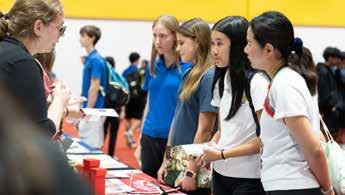
and individualized counseling process beginning in Grade 9. Each student is assigned a dedicated college counselor, who works closely with them to explore their interests, refine their academic and extracurricular profiles, and build a strong application strategy. ISB’s counselors bring extensive experience from leading international universities and have strong relationships with admissions officers globally, ensuring students receive up-to-date insights and expert advice.
ISB offers a breadth of academic pathways that no other school in Bangkok provides. Students can

choose from the International Baccalaureate (IB) Diploma Programme, Advanced Placement (AP) courses, or a personalized ISB diploma with specialized coursework. This flexibility allows students to tailor their education to match their university aspirations—whether aiming for the Ivy League, top UK institutions, competitive STEM programs, or creative arts schools. The school’s rigorous curriculum is complemented by internships, research opportunities, and co-curricular leadership experiences, making ISB graduates stand out in the competitive university landscape.
ISB’s college counseling program consistently yields outstanding university placements, with students gaining admission to the most selective institutions across the United States, United Kingdom, Canada, Europe, and Asia. From Harvard, Oxford, and Stanford to top universities in Australia and Japan, ISB students secure places in highly competitive pro -
grams, thanks to the school’s strategic guidance and holistic support.
Beyond academics, ISB prioritizes the well-being and aspirations of each student, ensuring they find the best-fit university rather than just aiming for rankings. Through one-on-one counseling, parent workshops, and university fairs, ISB creates a collaborative support system that helps families make informed decisions about higher education.
For families seeking the most comprehensive and personalized college counseling experience in Bangkok, ISB is the clear leader. With a commitment to excellence, flexibility, and global success, ISB’s college counseling program provides students with an unparalleled advantage as they step confidently into their university journeys.
For more information about ISB, please visit our website www.isb.ac.th




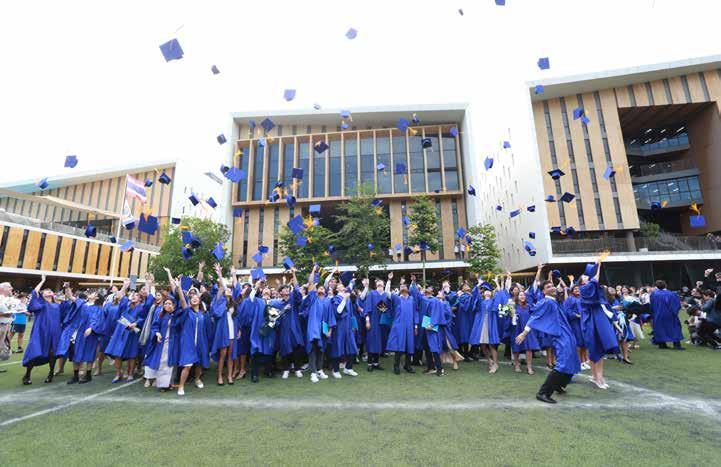
By: Alexander Manners University Guidance Counsellor at Bangkok Prep
In university counseling, the term “Best Fit” is widely used but often misunderstood. Many students and families assume it means choosing the highest-ranked university they can get into, believing that prestige alone determines success. But rankings don’t account for individual goals, learning styles, or personal well-being. Instead, Best Fit is a deeply personal choice , shaped by multiple factors that extend beyond reputation.
To truly understand Best Fit, students need to assess their options across a range of dimensions—academic, financial, cultural, and professional. The right university is not just a place to study; it’s an environment where a student can thrive .
A university’s reputation means little if the academic experience doesn’t align with the student’s learning style. Some thrive in large lecture halls, while others need
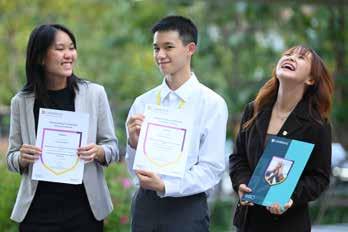
smaller, discussion-driven classrooms. Factors like faculty accessibility, research opportunities, and real-world application of knowledge can determine whether a student feels challenged and supported. A strong academic fit ensures that they don’t just attend classes but actively engage in their education.
Education is an investment, but it must be a sustainable one. Financial Fit involves assessing tuition, living expenses, scholarships, and long-term earning potential. A prestigious degree may lose its value if it comes with overwhelming debt and limited career opportunities. Students must consider the balance between affordability and future financial stability, ensuring that their education leads to greater opportunities, not financial strain.
The right university is not just about academics—it’s about how a student feels living there . Some students crave the energy of a bustling city, while others seek the quiet of a suburban or rural setting. Climate, housing options, and campus facilities all play a role in shaping a student’s experience. A great program means little if a student feels out of place in their surroundings.

Higher education is not just about earning a degree— it’s about what happens after graduation . A university should provide strong career services, industry connections, and internship opportunities. Some institutions are at the forefront of emerging fields, while others offer outdated curricula. For international students, post-study work visas and global employability are key considerations. A Future-Proof Fit ensures that students graduate with skills and connections that will remain relevant in an evolving job market.
A university’s culture shapes a student’s personal growth just as much as their academic journey. Some institutions are known for diversity and inclusivity, while others have strong traditions or distinct po -
litical and social identities. Feeling at home in a university’s culture can impact confidence, engagement, and long-term success.
Success isn’t just about academics—it’s about mental and emotional well-being. Some students thrive in highly competitive environments, while others need universities that emphasize balance and student support. Access to counseling, health services, and a supportive campus culture can determine whether a student flourishes or struggles under pressure.
A student’s university experience is shaped by the people around them. Some campuses foster a strong sense of community, while others promote independence. Opportunities to build friendships, join organi -
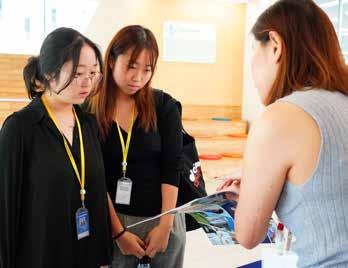
zations, and engage in extracurricular activities can be just as important as academics. A student who feels connected is more likely to succeed, both socially and professionally.
Choosing the right university is about more than prestige . It’s about finding a place where students can learn, grow, and thrive in a way that is meaningful to them . Instead of asking, “What is the highest-ranked university I can get into?” , students should ask, “Where will I be happiest and most successful?”
When Best Fit is viewed holistically, students move beyond the pressure of rankings and make a choice that supports their long-term happiness, growth, and success. The best university isn’t necessarily the one at the top of a list—it’s the one that feels like home.

At ELC International Schools Bangkok, learning is a dynamic, hands-on journey—where curiosity sparks inquiry, creativity drives discovery, and children are empowered to make meaningful connections with the world around them. Rooted in the Reggio Emilia philosophy and guided by the Ontario curriculum, our interdisciplinary, project-based approach nurtures confident, future-ready learners through exploration, collaboration, and real-world problem-solving.
This philosophy comes to life in our Year 5 and 6 Rewilding Space project. A once-thriving ecosystem on campus—home to soil, insects, and flora—is now being reimagined through the lens of sustainability, science, and design-thinking. Guided by their growing expertise in engineering, environmental science, and technology, the children are restoring this space with a powerful blend of curiosity, creativity, and purposeful inquiry.
Student-led inquiry, expertly guided
Small class sizes—capped at 15 students—create a closeknit environment where children collaborate meaningfully with peers, teachers, and visiting experts in fields like robotics, environmental science, and mathematics. In this setting, children aren’t passive learners—they’re active co-constructors of knowledge, engaging deeply with

complex investigations as they form hypotheses, share observations, and design experiments.
Teachers and specialist mentors guide alongside them, encouraging children to go deeper rather than simply providing answers. This is the Reggio Emilia approach in action—where curiosity leads and educators serve as learning partners, pointing children toward the resources and experts they need to pursue authentic inquiry. Our approach also integrates the Ontario Curriculum’s emphasis on transferable, future-ready skills.

One key question driving the project is: “What makes soil living,” and how can we measure or improve it? Through hands-on experiments, children discovered that soil isn’t just dirt—it’s alive with organic matter, microbes, and nutrient cycles. Using pH sensors and testing nitrogen, potassium, and phosphorus (NPK) levels, children began to track changes across the site allowing them to think critically, test ideas, and interpret data like real scientists.
“We want to see how the soil changes over time,” one Year 5 learner explained. “Measuring pH tells us if it’s healthy or poor.”
To monitor progress, students coded a Raspberry Pi camera for daily time-lapse captures and 3D-printed a protective mount. They also developed microcontrollerbased systems to track soil moisture—and even prototyped an automatic watering system that activates when soil gets too dry.
As one Year 6 student shared, “Each pin on the Arduino has a different job, so you have to be very precise.” These real engineering moments are helping students connect technology to environmental impact.
With student-to-teacher ratios often 1 to 4 or 5, sessions are rich and varied—children might analyze soil under stereoscopes with a science lead, interpret sensor data with the math coordinator, or interview local ecologists, horticulturists, and environmental engineers. These experts help refine the children’s experimental design, validate their questions, and bring real-world relevance to the work—showing how scientific inquiry can positively


impact the environment and community.
“It’s remarkable to watch,” said one robotics expert. “When children have time to experiment, rethink, and try again, their ideas become more inventive. They really own their learning.”
Expert-guided, impact-driven
Children also meet with local professionals to deepen their understanding of sustainability. Interviews with ecologists, horticulturists, and environmental engineers offer insights into composting, soil health, and seed dispersal—further grounding the work in real-world science and purpose.
Math, science, coding, and design-thinking all come together here—but art and empathy remain central. One student reflected: “Beauty is everywhere—even in soil or a brick. And it’s the same with people. When you really get to know them, you find something beautiful in them.”
Whether you join a campus tour, peek into an Arduino session, or walk through our outdoor atelier, you’ll find children not just learning—but leading. With small classes, expert guidance, and hands-on projects, we prepare children not just for school—but for the future they’re already shaping.
www.elc.ac.th


Education is evolving at a rapid pace and the spaces in which pupils learn are transforming alongside it. Today’s educational environments are designed to nurture collaboration, creativity, and critical thinking. As society changes, schools need to adapt to ensure that pupils are equipped with the skills they need to thrive in a dynamic world. At the forefront of this global shift is Brighton College Bangkok, a school that understands the importance of designing environments that support the full spectrum of a young person’s development.
The way young people interact within a school environment varies significantly with age. In the early years, learning can often be rooted in physical activity, play, and exploration. Gross motor skills, developed through climbing, running, and balancing, are fundamental to cognitive development. Purpose-built play areas, open green spaces, and interactive classrooms encourage younger pupils to develop coordination, problem-solving skills, and social awareness.
As pupils progress into their teenage years, their educational needs shift. While physical spaces remain crucial, the emphasis turns towards developing collaboration, independent learning, and critical engagement. Learning no longer happens solely within the confines of a traditional classroom. Instead, group discussions, research projects, and interactive technology create an environment where


pupils can develop the adaptability and teamwork skills they will need beyond school. Modern education is as much about learning how to think as it is about absorbing knowledge.
Recognising these shifts, Brighton College Bangkok’s learning spaces reflect the evolving needs of its pupils. Nowhere is this more evident than in the newly designed Sixth Form Centre , a state-of-the-art facility that prepares pupils for life at university and beyond.
At the heart of this new development is the Futures Centre , a dedicated space for university guidance, careers advice, and networking activities. This innovative hub enables pupils to explore future pathways in a setting that mirrors the professional world. Here, they can engage with industry professionals, receive personalised university counselling, and take part in mentoring programmes. The Futures Centre is not just about helping pupils choose a university; it is about equipping them

with the skills, knowledge, and confidence to navigate the complexities of the modern workforce.
Complementing this is the Sixth Form Club , a space designed for social interaction, collaboration, and extracurricular engagement. Education is not just about academic success; it is also about personal development and the ability to connect meaningfully with others. The Sixth Form Club develops a sense of community, providing pupils with a dedicated space to work in groups, engage in discussions, and participate in a wide range of activities. Whether they are collaborating on a project, leading a debate, or simply relaxing with peers, this space acknowledges the importance of social learning in the educational journey.
The best schools are increasingly designing spaces that break away from traditional models of education. The most forward-thinking institutions understand that an effective learning environment should resemble the real world - whether that is a university campus, a research lab, or a professional workspace. Classrooms are evolving into collaborative hubs, libraries are becoming interactive learning centres, and common areas are being transformed into spaces that encourage discussion and debate.
Brighton College Bangkok stands as a shining example of this progressive approach, demonstrating that the most successful schools are those that create environments where pupils feel inspired, supported, and prepared for the future. By embracing change and reimagining what a school should look like, Brighton College Bangkok is not just educating the next generation, it is shaping the future of education itself.
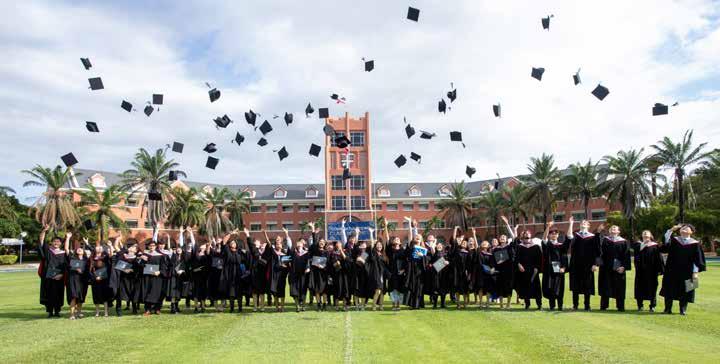
Regents International School Pattaya is a day and boarding school with 30 years of excellence in academics and holistic education. The school prides itself on thinking beyond traditional education to transform learning.
It has been at the forefront of education by launching a wide range of initiatives for its students, which have produced exceptional educational outcomes and university placements.
Regents International School Pattaya’s 30th Anniversary is not the only thing that makes the school stand out on the Eastern Seaboard. The option of either IBDP and A-Level in Sixth Form is unique.
The International Baccalaureate Diploma Programme (IBDP) is a two-year pre-university curriculum designed to be academically challenging, broad, and comprehensive. Aside from providing high academic standards, the programme also helps students develop essential skills that top universities are looking for. Overall, the programme prepares students for success at university and life beyond as it helps them apply critical thinking skills to real-world situations.
Students select six DP courses, giving them a broad range of subjects to study. Thus, leaving a range of opportunities open to them for future study while still deciding what they want to pursue at university.

In 2024, Regents’ IBDP students achieved an average score of 34, once again exceeding the global average of 30.3 points.
A-Levels is a UK subject-based qualification. It allows students to select their three key best subjects, specifically picked for their choice of university courses.
Regents International School Pattaya teaches and trains students in a unique approach different from other A-Level programmes. The school teaches students using sound pedagogical research, allowing them to create connections and think for themselves in ways they never imagined.
Curious to learn more about how Regents’ internationally focused curriculum, access to the best teachers globally, and world-class facilities can benefit your child? Visit regents-pattaya.co.th
Krabi Spesialisten Co., Ltd., a Norwegian-owned tourism operator in Thailand, has been officially recognized as a Travelife Partner for its commitment to sustainable tourism.
Travelife is an internationally recognized certification system for sustainability in travel businesses.The Partner status marks a step toward Krabi Spesialisten’s next goal—full Travelife Certified status.
Krabi Specialisten has eliminated single-use plastics on tours, provides reusable bottles and utensils, and works closely with local
communities by hiring local guides and supporting schools through donations.
“Sustainability has always been at the heart of what we do,” says Founder and Managing Director Ingeborg Fallet Kristensen.
“This achievement demonstrates that responsible tourism is possible at all levels.”
The company is also involved in environmental initiatives such as Trash Hero Ao Nang, Refill My Bottle, and coral reef restoration projects.

The Royal Norwegian Embassy (RNE) in Manila, in partnership with Sulong Peace Inc. (SPI), conducted a field visit to Negros Island, reaffirming Norway’s commitment to peacebuilding and security cooperation. The visit, led by Norwegian Ambassador Christian Halaas Lyster, coincided with
Mt. Kanlaon communities’ 90th day of evacuation under Alert Level 3, highlighting the intersection of conflict resolution and disaster response.
“For Norway, peace and reconciliation work is long-term. This visit to Negros underscores our continuing commitment to the Phil-
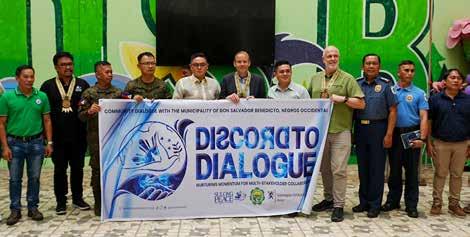
ippines’ quest for lasting peace,” said Ambassador Lyster.
In Bacolod City, the delegation met with local officials and security forces to discuss conflict prevention and disaster response. They also visited Canlaon City and Don Salvador Benedicto, where they engaged with mayors and community leaders on sustaining peace efforts through strong local governance.
A dialogue with former rebels addressed reintegration challenges and pathways to dignified livelihoods, reinforcing stability efforts. With Mt. Kanlaon’s crisis displacing communities for over 90 days, discussions also emphasized the need to integrate peacebuilding with disaster recovery planning.
Norway and SPI remain committed to fostering inclusive, lasting peace in Negros.
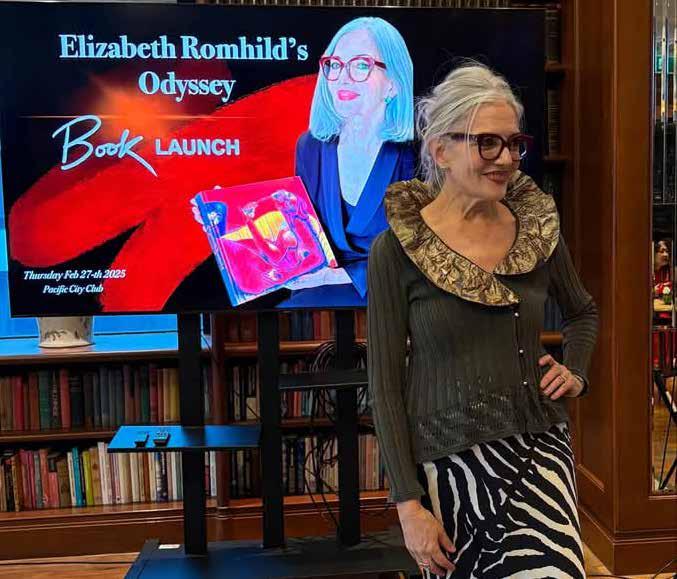
By Agneta de Bekassy
Elizabeth Romhild is a woman of many talents and a heart full of warmth. Half Danish and half Armenian, she is married to her Danish husband, Peter, a proud mother of a son and a daughter, and a loving grandmother to two little boys.
But beyond her cherished family roles, Elizabeth is an incredibly creative and accomplished artist—and my dear friend of many years.
On February 27, she launched a book featuring a stunning collection of her 40 years of vibrant, colorful paintings and designs.
“This is my third baby,” Elizabeth said with a smile. “And it took even longer than my two children—over a year in the making.”
The elegant Pacific City Club in Pacific Tower 2 on Sukhumvit was the perfect venue for the book launch, where she welcomed the media for an afternoon pre-
view, followed by an evening celebration with friends and well-wishers. Many took the opportunity to have their copies personally signed by Elizabeth.
The evening also featured an auction, with proceeds donated to the Queen Sirikit Centre for Breast Cancer (QSCBC), a renowned facility where the highly respected Dr. Kris Chatamra serves. Dr. Kris founded the Queen Sirikit Centre for Breast Cancer, which was inaugurated in 2005 under the patronage of Her Majesty Queen Sirikit of Thailand.
Dr. Kris has over thirty years of experience in breast cancer treatment, having served as a senior clinician in the UK and as a member of the Court of Examiners at the Royal College of Surgeons of England. He established the QSCBC to provide advanced breast cancer care, including for underprivileged women in Thailand. Dr. Kris is a Thai national, and he attended the event alongside his English wife, Khunying Finola.
Elizabeth’s connection to this cause is deeply personal; since meeting HM Queen Sirikit in June 2005, she has proudly served as an ambassador for breast cancer awareness. Over the years, she has donated numerous artworks to support various charitable organizations.
The auction included a bronze sculpture and an oil painting on canvas. Elizabeth wants to encourage women to share any experiences they may have had with breast cancer.
Elizabeth’s journey into the world of art began when she was 26. Her first exhibition took place in Indonesia in 1986, where her family was living at the time. It was there that she truly found her passion.
“That’s where I became an artist,” she says. Inspired by Picasso’s biography, she began painting—and you can often see echoes of Picasso and Chagall in her bold, colorful works, but with her own distinctive style. She started with watercolors but eventually transitioned to oil paints, a medium she still loves today.
But Elizabeth’s creativity doesn’t stop at painting. Over the years, she has sculpted, created mosaics, designed jewelry collections, and crafted porcelain pieces. Pianos, a lifelong passion of hers, often appear in both her jewelry and porcelain designs.
These days, large-scale paintings have become less frequent as she feels the strain on her shoulder from years of brushstrokes. So what’s next for this unstoppable artist?
“Que sera, sera—whatever will be, will be,” she says with a twinkle in her eyes. She’s open to exploring new creative ventures, whether it’s designing wallpapers, carpets, scarves, or handbags.
There’s truly no limit to what this imaginative woman can achieve.
If you’re looking for something unique, you can even order a Bang & Olufsen speaker designed by Elizabeth herself.
And for those lucky enough to visit her studio in Bangkok, you’ll find a carefully curated collection of her
This is my third baby, and it took even longer than my two children —over a year in the making.
remaining pieces—works she guards with the care of a devoted mother hen.
While parting with her art is never easy, she’s grateful and honored that so many choose to adorn their homes and public spaces with her creations.
Her remarkable 312-page book, printed in Denmark—a country known for its world-class printing—is a feast for the eyes. Available online and at Asia Books locations in Siam Paragon, Central World, and EmSphere, as well as Kinokuniya bookstores, the book is priced at 3,800 THB. Elizabeth hopes it will inspire others to pick up a brush and start painting. She herself never formally studied art—her skills are the result of endless imagination and practice.
“The more you paint or sculpt, the better you become,” she says with conviction. “And you have to dare to try.”
There’s so much I could write about Elizabeth. She is not only a gifted artist but also a dedicated wife, mother, grandmother, homemaker, and friend. Being part of Elizabeth and Peter’s circle is an honor I treasure, and I hope our friendship continues for many more years to come.
I also have to say I was absolutely amazed at the auction. I’ve never experienced an auction where the buyers wanted to raise the starting prices. Elizabeth’s oil painting and sculpture were both sold to two Thai buyers—and that’s not all. Both the painting and the sculpture were later donated to Dr. Kris and the Queen Sirikit Centre for Breast Cancer. Dr. Kris happily received 2.1 million THB from the auction and book sales. A very happy doctor and a proud artist—what an unforgettable evening!
Here’s to Elizabeth Romhild—an extraordinary woman whose art and spirit bring so much beauty and inspiration to the world!
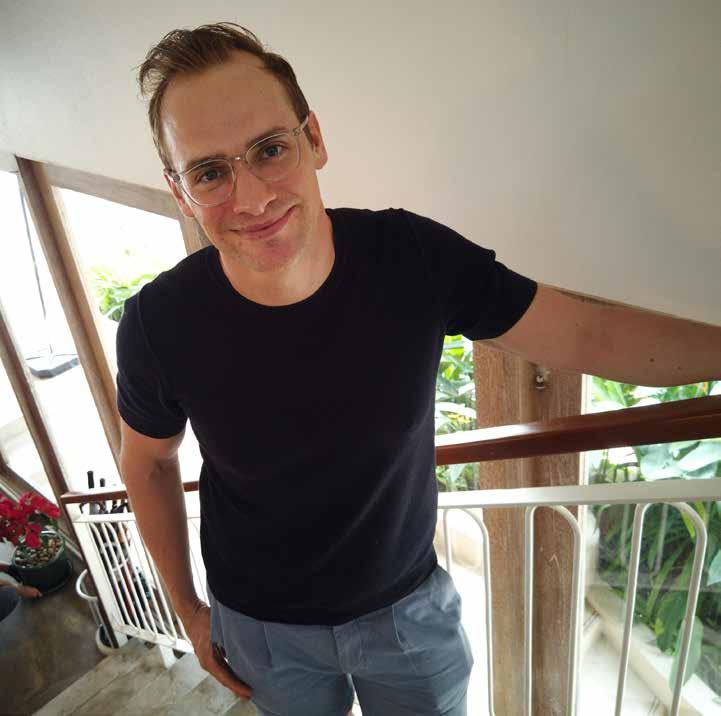
By Joakim Persson

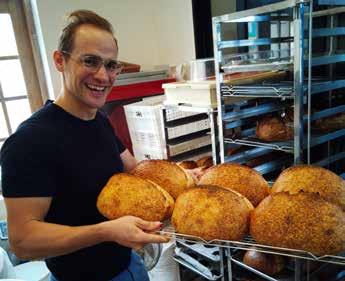
100% sourdough. No cheating – is what is promised by the Danish-Norwegian-owned bakery and artisanal sandwich café concept called BARTELS, with operations in Bangkok, Phuket, and Saigon.
Bartels, which is the surname of co-founder Nicolai, is a business that came about by chance and is now also benefiting from a somewhat unexpected development within the residential community in Phuket following the Covid-19 period.
Partner and investor Jakob Lykkegaard Pedersen –known to many as the former co-owner of PlayLab and an AR games producer with his own Lykke Studios, and who is himself a Phuket resident these days – explains at the Blue Tree Phuket-based outlet in Cherng Talay.
Behind this business are some remarkable coincidences that made things happen. Jakob met Nicolai Bartels and his partner Eva by chance as they moved into a home he was leaving. Nicolai had for many years been baking sourdough bread in his spare time – and fine-
From the moment we opened up, we have pretty much enjoyed a full house. It felt like we hit a void here.

tuned his baking skills in the process, especially regarding the complexity of baking this particular type of bread. As a consequence of Covid-19, Nicolai and Eva’s business, Scandinavian Makeup Academy, was temporarily shut down, and they found themselves sitting on a Sukhumvit roadside rental contract. They decided to utilize the location and follow their dream of creating a neighborhood hangout with sourdough bread baked in-store, artisanal sandwiches, and great coffee.
“People liked the bread, and I was actually one of the first customers because they started posting about it. I tasted the bread and got enthusiastic and told him: ‘This could be so much bigger than this!’” recalls Jakob.
“I got involved partly out of personal need, having just moved to Phuket and missing good bread and coffee. The quality wasn’t here; I would say pre-Covid, Phuket was dominated by tourist-trap-type food services in many places. But since the Covid-19 period, so many

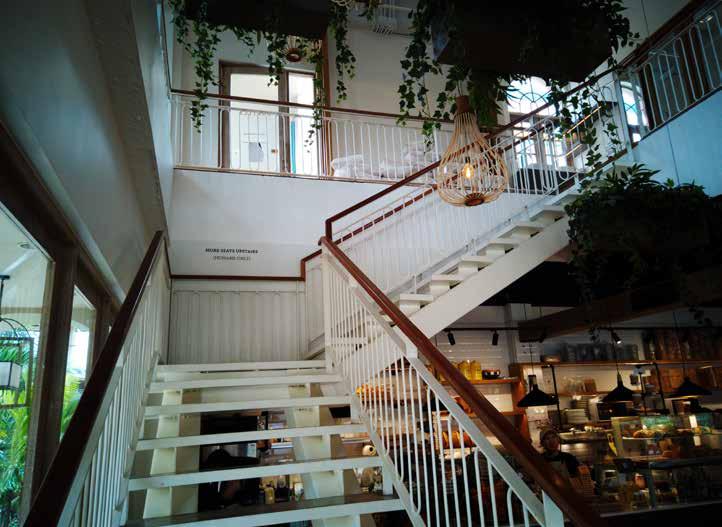
people have been moving here from Bangkok, Hong Kong, Singapore, etc. – who have this sense of quality that they want. So, I suggested opening Bartels in Phuket as well, instead of just Bangkok. I then joined the company, invested, and we opened the second branch, which was in Bang Tao.”
“This was in May 2021, so even though we could get hold of a preferred street-front location for a good price, it for sure took some convincing with Nicolai that this was the right move, at a time when there were few people around due to Covid-19.”
“But from the moment we opened up, we have pretty much enjoyed a full house. It felt like we hit a void here,” reflects Jakob.
This means that thanks to this change in demographics and other recent factors, such as the skyrocketing cost of living in Singapore in particular, Bartels has been experiencing another – and no doubt welcome –coincidence: namely, getting as main customers a volume of expatriates previously unseen on the island!
And regardless of what segments each F&B venue targets, from 2022, the island started to see a large volume of new F&B outlets opening up, very much concentrated in popular residential areas like Cherng Talay and Rawai, in addition to the large tourist hotspots.
“A lot more places have opened now, and we are busier than ever. And in the past, Phuket wasn’t really
known for great food or a nice lifestyle, but I feel that a lot of that has improved. So, the more we can get great cafés, restaurants, and hotels, the more people that will also attract the right clientele. I don’t really see the tourist buses anymore – rather, it’s about people who have bought a home and are living here.”
While none of the entrepreneurial founders have any F&B background, Jakob happily calls Nicolai a ‘chef’ since he deems that he is so passionate and adept when it comes to sourdough: “It’s a complex process to master since you don’t use commercial yeast. I would say even our baking team here is amazing, but if you put them in another room with other equipment, they can’t necessarily replicate what we have here – where you need someone like Nicolai to help with the tweaking and learning to smell the dough development from the fermentation.”
“Here in Thailand, we do it a little bit lighter than what you’ll find in Denmark – which also fits the local palate better; the nice wheat taste also makes the ingredients of the sandwiches shine through.”
Jakob, meanwhile, has been very much involved and passionate about conceptualizing the brand concept and creating a unified guest experience, both in terms of the quality of food and drinks as well as the design for all the branches of the artisanal sandwich café concept. Getting the coffee right alone has involved a big effort, with a complete replacement of everything from water filtration

to espresso machines, grinders, beans, and roasters.
Bartels also has a focus on healthy food, with ingredients like ginger, salads, grain bowls, and booster smoothies.
“Of course, one can get cakes, pastries, and everything else, but we want to make sure that all ingredients are unprocessed, clean, and fresh. You know what you’re getting – which is very much home-baked style for everything.”
“We also want to achieve the feeling that once you enter any Bartels outlet, you feel the familiarity of the brand. Thus, we try to reuse the same elements across the different locations to get that similar feeling. We call it Tropical Scandinavian,” says the Dane and continues: “We focus very much on keeping it real; the design needs to be pleasant to your eye, the wood and the plants you touch are real – it’s like everything needs to fall into place. We don’t want to leave anything to chance.”
They have designed it from their heart, and a lot of people notably share their feelings about what looks and feels good, shares Jakob, who himself eats there six times a week and even uses the home delivery service.
“The bread is a big seller for sure, and I can confidently state that nobody beats us on this. But we focus a lot on the atmosphere, where we aim to make the Bartels branches into community hotspots where people meet up – which is also what we have ended up achieving.”
We focus a lot on the atmosphere, where we aim to make the Bartels branches into community hotspots where people meet up.
Their guest clientele – apart from getting an additional 20-30% more customers during high season –consists of island residents.
“Even in September, we’re pretty much full over breakfast and lunch, especially on weekends and at Blue Tree, mainly with residents. The outlet in Bang Tao, meanwhile, has a lot more people from Laguna and its properties coming in – people staying here for 3-4 days up to a few months.”
Bartels’ success – paired with optimism – also means that they are expanding, with more branches to open in Phuket, Bangkok, and Vietnam.
“2025 will be a busy year for us, with three more branches opening in Bangkok and Saigon and two new Phuket branches in Chalong and Kamala. Going forward, Phuket Town and Rawai are also interesting locations. I don’t expect any downturn similar to what Phuket experienced in the past. From 2019 to now, Phuket is completely different, with so many new residents having come in, and with the big cities not really being that popular anymore. The main difference between now and before is that families have moved here and put their kids into school, so they don’t just move back after a few years but have actually fully established themselves here. So, I am definitely not seeing any bubble that will burst,” believes Jakob.


March and April are not among my favorite months in Thailand. You barely step out of the shower before you’re already feeling sweaty and sticky again. Trying to get your hair to look halfway decent — well, that’s not even worth the effort.
It’s this time of year in Thailand that always makes me think of Karin Boye’s poem “Yes, of course it hurts.” It’s probably the only poem that’s ever fully stuck with me. I picture delicate greenery, cherry blossoms bursting into bloom, lighting up with their soft pink color, and pussy willows that immediately make me think of Easter. I imagine birch trees with fresh, limegreen leaves…
This is the time when you really ought to be in Scandinavia or northern Europe.
In Thailand, we now await Songkran. Once upon a time, it was a beautiful holiday where the younger gen-
eration showed respect to their elders by gently washing their hands and feet.
Today, in my opinion, it has turned into one big water fight. For a few days, it’s impossible to go out unless you’re willing to accept getting completely drenched.
On the 13th of March, I was invited to a media event at Alliance Française, a preview of the circus show Café Oui-We.This is a unique show blending dance, aerobatics,

For a few days, it’s impossible to go out unless you’re willing to accept getting completely drenched.
and theater. If you are familiar with Cirque du Soleil, you know what I’m talking about.
Alliance Française has since September last year had a new director, M. Jean Bourdin. M. Bourdin welcomed us together with a dedicated team consisting of Chloe Farah, general and artistic director; Emelie Michelon Paquier, executive producer; Michel Rioux, adviser for creation, production, and operations; and Benoit Pailette, strategy lead.
Café Oui-We is a comedy set in a café in the south of France. In this show, you’ll experience performances featuring the German wheel, Chinese pole, juggling, handto-hand acrobatics, aerial hoop, aerial rope, and Chinese hoops.
One of the stars of the show is Emelie Silliau, who started her career as a gymnast before transitioning to circus arts at the age of 24. Over the years, she has worked with renowned companies like Cirque Starlight and Les 7 Doigts de la Main.
Emelie is married to Julien Silliau, who grew up in his mother’s circus school in France before continuing his training at the Circus School of Montreal, where he developed a unique style with the German wheel. In 2011, he set a Guinness World Record in Milan and later joined the 7 Fingers company. He eventually founded his own company, Collectif A4, and became a well-known creative artist.
Another performer, Tom Proneur, is a multidisciplinary artist. He began his career in contemporary dance before specializing in circus arts.
He’s known for being an innovative show creator and a respected figure in the circus world.
From Brazil, Alluana Ribeiro has been passionate about circus from an early age. She holds a master’s degree in literature and, after completing her studies, moved to France to train in circus arts. Over the years, she has worked with many prestigious companies.
Finally, we have Frederic Langevin and Matthieu Larose, two incredibly talented young men in their 20s. Frederic discovered the world of circus at the age of 8 and trained at the National Circus School of Montreal,
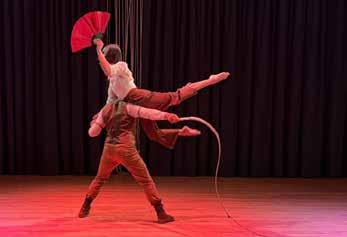
specializing in Chinese hoops and hand-to-hand acrobatics. Matthieu, a circus artist from Quebec, also graduated from the National Circus School of Montreal, specializing in hand-to-hand acrobatics and aerial movements. These two young men give 100% of themselves in their performances.
For the performances at Alliance Française, Chloe Farah (formerly of Cirque du Soleil) is the director. Chloe is a medical doctor specializing in osteopathy. She practices both classical and holistic medicine and is also a renowned acrobatic designer, coach, and choreographer. She has worked extensively with Cirque du Soleil, starting as an aerial straps performer. This multi-talented woman truly wears many hats.
If this has sparked your interest, don’t miss the chance to attend one of their performances, running until May 18 at Alliance Française. The ticket price includes a complimentary cocktail at the newly opened and very charming bar on the ground floor.
This is the future of the circus—no animals trained to perform, just pure artistry and creativity. Café Oui-We ’s manager welcomes you warmly to the stylish new bar. Book your tickets now so you don’t miss out on this truly exceptional show.
I and photographer Daniel Herron really enjoyed the short pre-show. I am sure you too will enjoy the full show!
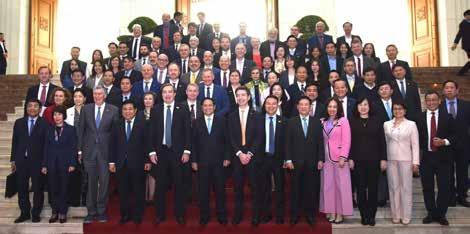
EuroCham Vietnam met with Prime Minister Pham Minh Chinh on 2 March 2025 to discuss trade and investment between Vietnam and the EU. The meeting, attended by government officials, provincial leaders, and European diplomats, focused on regulatory
reforms, investment climate, and industry challenges.
Key topics included:
• Regulatory reforms – Addressing administrative barriers to improve the business climate.
• Investment climate – Emphasizing
a stable legal framework to attract foreign investment.
• Sector insights – Discussions on energy, agriculture, healthcare, logistics, and sustainable manufacturing.
Representatives from EDP Renewables, Bayer, Sanofi, Bosch, and HEINEKEN Vietnam shared insights into their operations. The Prime Minister reaffirmed Vietnam’s commitment to fostering a businessfriendly environment, encouraging European investment in high-tech industries, infrastructure, and renewable energy.
As Vietnam and the EU mark 35 years of diplomatic relations, EuroCham remains engaged in strengthening economic ties and promoting sustainable investments.
The Sino-Nordic Seminar in Hangzhou brought together key stakeholders to discuss water and green transition initiatives, reinforcing the growing collaboration between the Nordic countries and China in tackling climate change.
According to the report published on Facebook from the Embassy of Denmark in China, the central focus of the seminar was sustainable water management, with the Danish Water Alliance China (DWAC) playing a pivotal role in driving progress.
Mads Vesterager Nielsen, Danish Commercial Consul and Team Leader for Water & Environment in
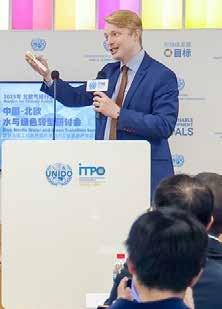
China, emphasized the importance of international cooperation in developing technological solutions to address global water challenges. His speech highlighted key areas such as PFAS removal, climate adaptation strategies, and water efficiency.
The event attracted innovative companies from both the Nordic countries and China, facilitating a dynamic exchange of ideas and expertise. This engagement underscores the significance of cross-border collaboration in accelerating the green transition and advancing sustainable solutions.
Three European nations have asked the Trump administration for their unspent USAID contributions to be refunded. Sweden, Norway and the Netherlands had been partnering with USAID on a project called Water and Energy for Food, or WE4F.
Their combined $US15 million ($24 million) which these countries they contributed for joint development work overseas had been parked at the US Agency for Inter-

national Development for months, they said.
Closing down USAID was one of the first actions of the current US
Presidet Donald Trump after he was inuagurated.
The Water and Energy for Food (WE4F) initiative operates in various countries across Asia through its South and Southeast Asia Regional Innovation Hub (S/SEA RIH). The hub supports innovators in 15 countries, including Cambodia, Indonesia, Laos, Malaysia, Myanmar, Philippines, Singapore, Thailand and Vietnam.
Jacqueline Poh, the Managing Director of Singapore’s Economic Development Board (EDB), has been awarded the prestigious NBAS Award by the Norwegian Business Association Singapore (NBAS). The award recognizes individuals or organizations that have significantly contributed to strengthening business relations between Norway and Singapore.
Poh, who will soon assume the role of CEO at JTC Corporation, has been instrumental in fostering collaboration between the two nations in sectors such as maritime, energy, sustainability, and innovation during her 3.5-year tenure at EDB. Under her leadership, EDB attracted substantial investment commitments, playing a crucial role in Singapore’s economic recovery following the Covid-19 pandemic.
She was presented with the
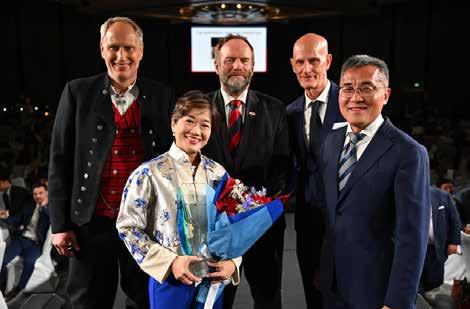
NBAS Award during the Norwegian Seafood Dinner, an event that celebrates Norwegian business engagements in Singapore. The award highlights her dedication to building international partnerships, including
those with Norwegian enterprises. NBAS extended its congratulations to Poh, acknowledging her lasting impact on Norway-Singapore business relations and wishing her success in her new role at JTC.

Kemira has announced a multimillion Euro investment to expand its production capacity at its Wellgrow manufacturing site in Thailand. According to the company, the project will enhance its position as a leading supplier of paper and board chemicals in the
Asia-Pacific region.
Strength agents are used to improve the mechanical properties of paper and board products. Kemira says its new technology reduces water usage, increases material efficiency, and offers higher strength performance, helping customers boost productivity and reduce environmental impact.
“To further strengthen our leading position in APAC, we are expanding our production in Thailand for future growth,” says Harri Eronen, Executive Vice President, Packaging & Hygiene Solutions, Kemira.
“The Asian pulp and paper market is growing among the fastest globally, and this investment will enhance our capabilities to provide cutting-edge, sustainable chemical technology to serve our customers.”
Following the expansion, the total annual production capacity at the Wellgrow site—located near Bangkok airport and the Port of Bangkok—is expected to reach approximately 100,000 tons. The site is supported by Kemira’s regional and global research and innovation teams.
Danish footwear brand ECCO has named Malaysian singer-songwriter Yuna as the face of its Icons That Last campaign in Malaysia and Singapore for its Spring/Summer 2025 collection.
The campaign highlights Yuna’s journey as an artist who has carved her own path to international success. It showcases ECCO’s 12-hour heels collection, including the ECCO Sculpted Alba 65, engineered with Fluidform™ technology for lasting comfort. Yuna has also curated The Yuna Edit on ECCO’s website, featuring her top footwear picks.
“ECCO echoes my personal belief in fashion,” Yuna shared. “It should be unique, interesting, and fun, but above all, quality and comfort must come first.”
This collaboration follows Yuna’s Etherealis concert in February
at the Petaling Jaya Performing Arts Centre, marking her return to solo performances in Malaysia.

Dr. Sunya Viravaidya, a pioneering figure in Thailand’s medical community and a beloved member of the Pattaya community, passed away on March 8, 2025, at the age of 79. Dr. Sunya, Thai-Scottish by birth, began his career at Ramathibodi University Hospital in Bangkok before founding the Pattaya International Clinic in 1974, which evolved into the esteemed Pattaya International Hospital by 1980.
Dr. Sunya Viravaidya served as the Honorary Consul of Sweden in Pattaya for a decade, concluding his tenure in June 2014. During his service, he was awarded the Order of the Polar Star by Ambassador Klas Molin on behalf of King Carl XVI Gustaf of Sweden and the Royal Swedish Government on October 3, 2014. His successor, Mr. Chatchawal Supachayanont, assumed the position of Honorary Consul in June 2014.

Swedish fintech company Vilja has expanded its operations into Vietnam with a new development hub in Ho Chi Minh City, following earlier expansions into Malaysia and Thailand.
According to Vilja, the new hub will strengthen its capabilities in cloud-based core banking solutions and support financial institutions in their digital transformation efforts.
“Vietnam offers a strong talent pool in software development, and our new hub will play a crucial role in our global operations,” says Fredrik Ulvenholm, CEO of Vilja.
The expansion into Vietnam follows Vilja’s establishment of its ASEAN headquarters in Kuala Lumpur, Malaysia, in late 2024. The company plans to open a new development center in Kuala Lumpur by 2025, with an initial investment of RM50 million over five years.

In addition to Malaysia and Vietnam, Vilja expanded into Thailand in September 2024, forming strategic partnerships with local firms to drive innovation in digital banking. The company’s continued growth in Southeast Asia reflects a broader trend of Nordic fintech firms enter-
ing the region to leverage its skilled workforce and rapidly developing financial technology sector.

The Finnish-designed Nguyen Hoang Bridge in Hue officially opened on March 26, 2025, coinciding with the 50th anniversary of Hue’s liberation. Spanning the Huong River, the bridge was designed by Finnish architect Antti Karjalainen in collaboration with WSP Finland and Hanoi-based AETC.
Inspired by Hue’s imperial heritage, the bridge features 64 golden parasols symbolizing the grandeur of the Nguyen Dynasty. It also includes an artistic lighting system that enhances its visual appeal while blending with the city’s historical landscape.
With a total investment ex -
ceeding VND 2.281 trillion, the bridge is 380 meters long, 43 meters wide, and over 20 meters high. It includes six vehicle lanes and two pedestrian walkways, easing congestion on National Highway 1A and improving connectivity between key cultural sites like Thien Mu Pagoda and Tu Duc Mausoleum.
Architect Antti Karjalainen expressed his pride in the project, stating:
“I am thrilled to contribute to a structure that brings a fresh aesthetic to Hue. The bridge stays true to my original design and plays a crucial role in the city’s development.”
The Nguyen Hoang Bridge is expected to boost tourism and economic growth, serving as both a key infrastructure development and a new cultural landmark for Hue.
Danish pharmaceutical company Novo Nordisk joined forces with Thai authorities in a public-private initiative to promote healthier urban living. As part of World Obesity Day 2025, the company participated in the Chula Obesity Day event, organized by Chulalongkorn University, aligning with the global theme “Changing Systems, Healthier Lives.”
The event brought together policymakers, including the Thai Health Promotion Foundation and the Bangkok Metropolitan Administration (BMA), to address Thailand’s rising obesity rates. Novo Nordisk highlighted its ‘Cities for Better Health’ initiative, which aims to reduce health inequalities and improve prevention efforts in urban settings.
“Obesity is a major challenge in

large cities like Bangkok—too complex for any single entity to tackle alone,” said Enrico Cañal Bruland, General Manager of Novo Nordisk Pharma Thailand, emphasizing the importance of multisectoral collaboration.
By engaging in this initiative, Novo Nordisk reinforces its commitment to tackling obesity on a global scale, with Bangkok potentially joining its growing network of partner cities.
The Consulates General of Finland, Norway, and Denmark in Shanghai teamed on Saturday 23 March with Chinese sustainable brand HowBottle to host a youth seminar and upcycling workshop focused on sustainability and the circular economy.
Companies from the three Nordic countries shared their sustainability practices with young participants, highlighting practical solutions to climate challenges. The day concluded with a hands-on workshop, where old tote bags were creatively transformed into pencil cases — offering the youth a tan -
gible experience in upcycling and waste reduction.
“Empowering the next generation with the knowledge and tools to tackle climate challenges is crucial for shaping a sustainable future,” said Anu Vuori, Consul General of Finland in Shanghai.
“Youth-led initiatives foster creativity but also build a sense of global responsibility, encouraging collaboration across cultures to protect our planet for generations to come.”
The week prior to the workshop, the three Nordic Consuls General visited HowBottle’s sus -

tainable store in Shanghai to explore how the company repurposes discarded plastic bottles into durable, wearable fabrics. The visit was part of the Nordics for Climate Action youth campaign launched in the city on 10 March.

In celebration of 120 years of ThaiNorwegian diplomatic relations, the Royal Thai Embassy in Oslo and the Faculty of Medicine at Siriraj Hospital are organizing a Charity Walk & Run scheduled for June 22, 2025, in Oslo, Norway.
The event aims to raise funds for underprivileged patients at Siriraj Hospital in Thailand.
The Charity Walk & Run will be supported from Bangchak Corporation Public Company Limited and its Norwegian subsidiary, OKEA ASA. A
press conference held on March 19, 2025, at Siriraj Hospital in Bangkok, featured key figures such as Mrs. Gloyta Nathalang, Senior Executive Vice President of Sustainability Management and Corporate Communications at Bangchak, and Mr. Komut Maneechai, Managing Director of BCPR Pte. Ltd. Also in attendance were Professor Dr. Apichat Asavamongkolkul, Dean of the Faculty of Medicine at Siriraj Hospital, and H.E. Ms. Nitivadee Manitkul, Thai Ambassador to Norway.
Participants can choose between 5-kilometer and 10-kilometer routes, starting at the Royal Thai Embassy in Oslo and concluding at the Oslo Opera House. The event is expected to attract over 200 participants, including Thais, Norwegians, and expatriates residing in Norway.
A.P. Moller Capital has agreed to acquire 40% of Philippine logistics company AC Logistics (ACL) from Ayala Corporation. A subsidiary of Danish shipping
giant A.P. Moller Group, A.P. Moller Capital will invest through EMIF II Holding III BV. The final subscription price is yet to be determined.
“A country of 7,000 islands
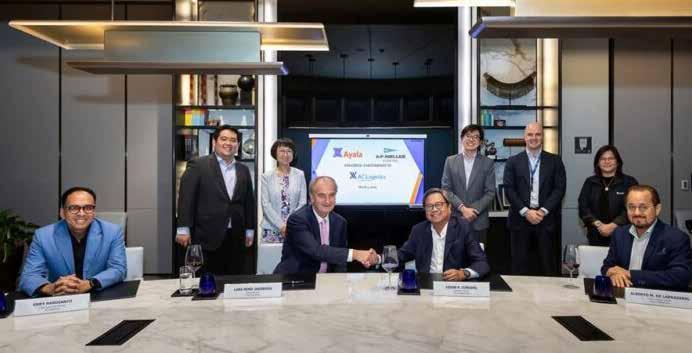
requires considerable logistics infrastructure, and we would like to help address this need,” said Ayala Corp. President and CEO Cezar Consing.
Founded in 2021, AC Logistics operates distribution centers and provides supply chain services across the Philippines. The investment aims to enhance logistics infrastructure and support national food security.
“This potential transaction with AP Moller Capital reflects Ayala’s strong commitment to growing AC Logistics into an industry leader that will deliver high-quality logistics solutions for the Philippines,” said AC Logistics president and CEO Erry Hardianto.
Finnish Customs has completed its investigation into a group suspected of smuggling nearly 25 kilograms of cannabis from Thailand to Finland. The operation was uncovered in 2023, and the suspects were arrested last autumn. The case has now been handed over to the Prosecution District of Southern Finland.
The smuggling took place in the Uusimaa region, leading to the arrest of five men, four of whom are Thai nationals. Authorities believe the drugs were transported via courier, mostly through Germany, and distributed primarily within the Thai community in Finland.
“The drugs were transported to Finland by courier, mostly through Germany,” said Hannu Sinkkonen,
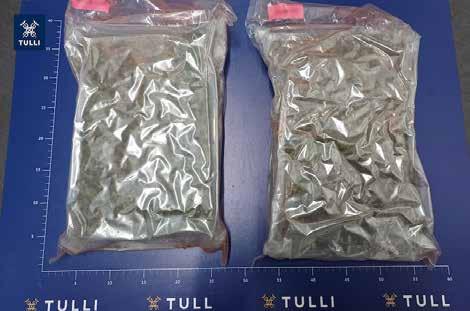
Director of Enforcement at Finnish Customs.
The seized marijuana has an estimated street value of EUR
375,000. Investigators found that the packages were delivered to multiple addresses in the Helsinki metropolitan area.
ANorwegian delegation took part in the buildingSMART International Summit held in Singapore from 18 to 21 March 2025, marking the first time the event was hosted in Southeast Asia.
According to buildingSMART Norway, the summit brought together over 400 professionals from 30 countries, focusing on the digitalization of the construction and infrastructure sectors. The event was hosted by buildingSMART Singapore and co-organized with the Building and Construction Authority (BCA) of Singapore and the International Alliance for Interoperability (IAI).
“The strong presence from Norway underlines our continued commitment to open standards and international collaboration in the built environment,” says Lars Chr. Fredenlund, chair of buildingSMART Norway.
The Norwegian participants included representatives from Caten-

da, Rendra, Statsbygg, and the Norwegian Digitalisation Agency. They joined global experts in discussing openBIM standards, interoperability, and sustainable digital transformation across the sector.
The summit featured technical sessions, user case presentations, and a special focus on collaboration between industry and government. One of the key topics was the role
of open data standards in achieving carbon reduction and improving productivity in the construction sector.
Singapore was selected as the host to highlight the country’s progress in digital construction. The summit was also part of International Built Environment Week (IBEW), Singapore’s largest platform for professionals in the field.
The Swedish diplomatic mission in Laos hosted a reception in Vientiane on 17 March 2025 to introduce Per Gradin as the
new Honorary Consul of Sweden.
The event reaffirmed the strong ties between Sweden and Laos.
Swedish Ambassador Anna

Hammargren welcomed guests and emphasized Sweden’s commitment to maintaining positive relations with Laos. She also congratulated the country on its successful ASEAN Chairmanship in 2024 and acknowledged its progress in economic stability and tourism.
Per Gradin expressed gratitude for his appointment and pledged to strengthen bilateral relations. The event was attended by Lao government officials, ambassadors from several countries, and representatives from international organizations, fostering opportunities for diplomatic and business engagement.

Norwegian companies will participate in the H2 Energy Future Expo and Forum (H2EX) 2025 in Kuching, Sarawak, to highlight Norway’s position as a global leader in hydrogen technologies.
Innovation Norway will lead a delegation of hydrogen experts and businesses to the event, which takes place from 12 to 14 June 2025. The forum will bring together stakeholders from across the hydrogen value chain to explore investment and technology collaboration opportunities.
The Norwegian Embassy in Kuala Lumpur noted that Sarawak’s ambition to become a regional hub for hydrogen aligns well with Norway’s extensive experience in renewable energy and hydrogen development.
Norway’s participation follows a memorandum of understanding signed in 2023 between Innovation Norway and the Sarawak Economic Development Corporation to promote cooperation on green energy.
Finnish Minerals Group and Beijing Easpring Material Technology have announced the start of construction for a cathode active material (CAM) plant in Kotka, Finland.
The plant, developed by Easpring Finland New Materials Oy, will produce CAM, a key component in lithium-ion batteries, with an initial capacity of 60,000 tonnes per year. The joint venture, established in 2024, is 30% owned by Finnish Minerals Group and 70% by Beijing Easpring Material Technology.
The total investment is estimated at EUR 800 million, with funding from the two owners, external loans, and clean transition aid. The Finnish State will support the initiative by capitalizing Finnish Minerals Group with EUR 100 million.
“With the Kotka CAM plant, we are creating an entirely new industry in Finland related to lithiumion battery production,” said Matti
Hietanen, CEO of Finnish Minerals Group.
Beijing Easpring views the project as a key step into the European market. “This investment establishes a European base to serve local customers,” said GUAN Zhibo, CEO of Beijing Easpring.
Located in the Keltakallio industrial area, the plant spans 27.8
hectares in its first phase. Its environmental permit was approved under the green transition priority procedure and became legally binding in December 2024.
Once operational, the plant will directly employ around 270 people. Construction begins in spring 2025, with commercial production set for 2027.

Ofiniti, a DNV company, on 5 March 2025 announced the appointment of Oliver Brix Sparsø as its new Global Director of Sales and the promotion of Emil Parmo Hansen to Global Sales Executive. The announcement coincides with the opening of Ofiniti’s new Copenhagen hub at Højbro Plads, strengthening its presence in the Nordic maritime sector.
At the same time, Ofiniti is expanding in Asia through the acquisition of Singapore-based Angsana Technology, a pioneer in electronic bunker delivery note (e-BDN) solutions. Angsana was among the first companies whitelisted by the
The Embassy of Sweden in Bangkok recently hosted a Business Breakfast gathering members of the Swedish business community in Thailand to discuss climate change and opportunities for bilateral cooperation.
Maritime and Port Authority of Singapore (MPA) to provide e-BDN services, aligning with Singapore’s upcoming mandate for digital bunkering from 1 April 2025.
Ofiniti’s acquisition includes the integration of Angsana’s BunkerFlow and DocuFlow products, forming a comprehensive digital ecosystem for fuel suppliers, vessel operators, and port authorities. The entire Angsana team, including founder See Lin Ang, has joined Ofiniti.
With backing from Singaporebased ShipsFocus and a Nordic family fund, Ofiniti aims to bridge Nordic maritime innovation with Asia’s rapidly digitalising ports.

According to the Swedish Chamber of Commerce in Thailand (Swecham), the event featured a presentation by Pavich Kesavawong, Deputy Director-General of Thailand’s Department of Climate Change and Environment (DCCE),
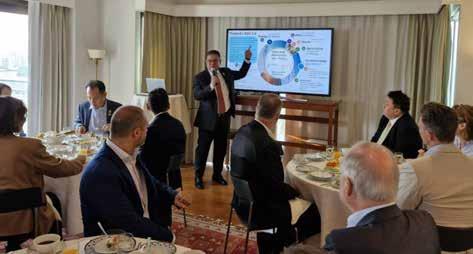
who introduced Thailand’s updated climate strategy—NDC 3.0.
The strategy outlines targeted greenhouse gas reductions across the energy, agriculture, industry, and waste sectors. Key components include early coal phase-out, the adoption of hydrogen and battery energy storage, and a stronger focus on sustainable waste management.
The event also explored opportunities for Sweden and Thailand to collaborate on green technology, innovation, and sustainable investment.
“Sweden stands ready to partner with Thailand in achieving these climate goals,” Swecham stated. “Tackling climate change requires joint efforts, and we are proud to facilitate dialogues that foster real impact.”
Greta Filén Hammarström, a 28-year-old Swedish woman, relocated to Nantong, China, after her husband received a job offer. This move allowed her to leave behind the stress of her former job as a preschool teacher in Sweden.
Greta spends her days taking care of the home, attending language lessons, exercising, and spending time with her three-year-old daughter. She enjoys the slower pace of life and the opportunity to en -

gage in activities she finds fulfilling.
Since moving to China, Greta has documented her life on TikTok, where she has faced both curios -
ity and criticism. Some argue that her lifestyle encourages financial dependence on a partner, but she emphasizes that she has a university degree, pension savings, and private financial security.
Looking ahead, Greta and her family plan to return to Sweden in 2027. While she enjoys her current lifestyle, she expects that both she and her husband will need to work once back in Sweden, especially given the rising cost of living.

Finnish textile service company
Lindström has launched its first service center in Vietnam, located in Bien Hoa City, Dong Nai Province. The facility introduces Lindström’s circular economy-based workwear rental model to the Vietnamese market.
“While the circular economy is at the heart of our offering, sustainability goes beyond that,” says Juha
Laurio, CEO of Lindström.
He emphasized the company’s holistic approach to sustainability— balancing environmental efficiency, employee wellbeing, and customer value. The service includes workwear rental with weekly delivery, laundry, and storage, helping businesses reduce waste and costs.
Vietnam’s focus on sustainable development creates favorable con-
ditions for Lindström’s expansion.
“Many Vietnamese companies share our climate goals, and we are committed to supporting them,” says Laurio.
Lindström has pledged to cut greenhouse gas emissions by 50% by 2030 and reach net zero by 2050.
Deputy Finnish Ambassador to Vietnam, Saramaria Kalkku, praised the role of Finnish companies in driving sustainability.
“Lindström’s solutions not only support environmental goals but also improve workplace health and safety,” says Kalkku.
Beyond business, Lindström is partnering with ActionAid Vietnam on a clean water project for schools in climate-affected Tra Vinh City, benefiting 5,000 children.
“This partnership shows how business can contribute to sustainable development,” says Hoang Phuong Thao, Chief Representative of ActionAid Vietnam.
Spring has arrived at the Danish Embassy in Beijing, where five new fruit trees have been planted in the embassy garden — three peach trees and two cherry trees.
According to a post on the embassy’s Facebook page, the planting was carried out by Ambassador Michael Starbæk Christensen and Morten Holm from FunFarmFam, who joined efforts to expand the garden’s orchard.
To mark the occasion, the embassy staff celebrated with apples and homemade organic apple juice, highlighting the seasonal atmosphere.
The tradition of tree planting at the embassy began last year on Arbor Day with the planting of three
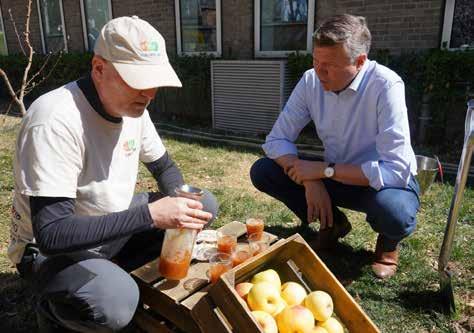
Thai–Swedish forward Patrik Gustavsson continued his strong form for the Thai national football team by scoring the only goal in Thailand’s 1–0 victory over Sri Lanka on Tuesday 25 March 2025 in the AFC Asian Cup qualifiers.
The 23-year-old striker, who plays for BG Pathum United, has now scored all three of Thailand’s goals during the March FIFA international window. Earlier in the week, he netted both goals in Thailand’s 2–0 friendly win against Afghanistan.
Gustavsson, born in Sweden to a Thai mother, has become a rising star for the national side and is increasingly seen as a key figure in

Thailand’s attacking lineup. Thailand’s next qualifiers are expected to draw further attention
as fans look to see whether the Thai–Swedish striker can maintain his scoring streak.
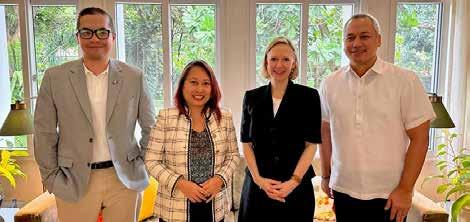
Swedish Ambassador to the Philippines, Anna Ferry, recently hosted a meeting with board members of the Sweden Alumni Network Philippines (SAN PH) to explore potential areas of collaboration.
The discussions focused on
sustainability, disaster response, and Environmental, Social, and Governance (ESG) initiatives, according to a post on the Embassy of Sweden in Manila’s Facebook page.
The Sweden Alumni Network Philippines (SAN PH) is a community of Filipinos who have pursued
studies or training in Sweden. Members include those who have attended Swedish universities, such as the World Maritime University in Malmö, received scholarships from Swedish institutions, or completed training programs organized by the Swedish Institute and other Swedish agencies.
SAN PH is officially certified by the Swedish Institute, which supports alumni networks worldwide to foster sustainable development and promote knowledge about Sweden.
To join SAN PH, you can connect with them through the Swedish embassy in Manila. Engaging with the group will provide information on membership criteria, upcoming events, and initiatives.
The week-long visit of the Danish Pig Alliance to the Philippines concluded on Saturday 29 March 2025 with a dinner hosted by the Ambassador of Denmark to the Philippines, Franz-Michael “DanDan” Mellbin, and Mme. Eva Fischer Mellbin.
The dinner brought together representatives of the participating Danish companies and key leaders from the Philippine pork industry. Over a meal that included a pork dish, discussions focused on opportunities for further collaboration between Denmark and the Philippines in strengthening the local swine industry.

According to the Danish Embassy in Manila, pork remains a vital part of Filipino cuisine and culture, with dishes like lechon and adobo serving as national staples. The industry also supports millions of jobs,
particularly among backyard farmers, and plays a significant role in economic development.
The Danish delegation reiterated their readiness to share expertise and technological solutions that can help improve productivity, biosecurity, and sustainability in the Philippine pig farming sector.
The event capped a series of meetings and site visits by the Danish Pig Alliance aimed at building partnerships and identifying areas where Danish agri-technology and know-how can contribute to food security and industry growth in the Philippines.


Fastelavn is a very Danish thing. Danes are by nature very childish and Fastelavn is a great childish event where parents dress up their children and themselves as pirates, fairies, angels and batmen. The highlight of the celebration involves gathering around a barrel filled with candy and taking turns hitting it with a stick until it breaks open, after which everyone enjoys the treats. It couldn’t be more Danish.
In Southeast Asia, the Danish Seamen’s Churches and other Danish churches abroad have taken on the role of preserving this cultural tradition. The only addition to the celebration is a short church service before the festivities begin.
All around, the day picked for the celebration was Sunday 2 March 2025..
In Bangkok, the event took place at the residence of Danish Ambassador Danny Annan and marked the first Fastelavn for Pastor Nicolaj Stubbe Hørlyck. Photos from the celebration were taken by Charlotte Christensen. However, it is not mentioned who took the photos at the other events. Nevertheless, they all captured the essence of

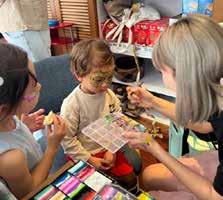
Danish Fastelavn perfectly.
In Singapore, the event took place at the Danish Seamen’s Church with two barrels – one for the toddlers and one for the older kids. Hot dogs, Fastelavn buns, and candy were enjoyed by all.
In Manila, where there is no Danish church, the local Danes


skipped the formalities and went straight to the party.
In Hong Kong, the Danish Seamen’s Church hosted the event at its own premises. A special highlight was the presence of a professional face-painting artist, who generously volunteered her time to decorate the children’s faces.


